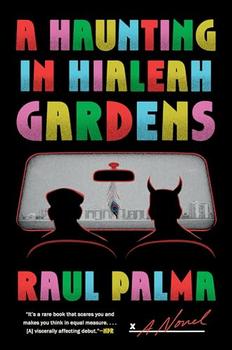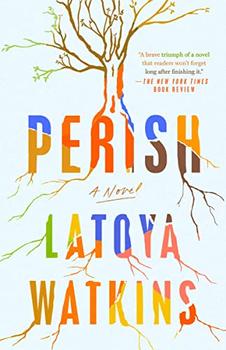Summary | Excerpt | Reading Guide | Reviews | Beyond the book | Read-Alikes | Genres & Themes | Author Bio

A Novel
by Raul PalmaRaul Palma's debut novel A Haunting in Hialeah Gardens introduces Hugo Contreras, who came to the United States from Bolivia as a child and is now a widower in Miami, where he staves off mountains of debt acquired in part from his late wife's cancer treatment bills by earning a meager living as a babaláwo, a priest in the Afro-Cuban religion of Santería — a set of beliefs that he secretly doesn't subscribe to. While faced with celebrating the holidays alone, Hugo receives a life-changing call from Alexi Ramirez, the predatory attorney whose firm has been attempting to collect on his debt. Like others seeking help from Hugo and his boss, Lourdes, Alexi believes that he is being haunted, and he proposes a deal: If Hugo clears his ghosts, he will clear Hugo's debt.
Will Hugo agree to "help" Alexi? Will he be able to do so convincingly? Is the haunting, contrary to Hugo's private skepticism about the supernatural, real? These questions give the plot life and the reader much to ponder and anticipate, yet Palma's novel is most intriguing for how it builds the details of Hugo's personal story around the suspense that ensues.
We learn of how Hugo worked in the Bolivian silver mines as a child, of the sense that he doesn't fit in among Florida's Cuban community, of the death of his wife Meli, of the ridiculous amount of interest he accumulated on a relatively small amount of credit card use that was activated for collection only because he unknowingly reset the statute of limitations on the debt by paying off the original balance years later. These experiences make Hugo sympathetic, and the human ways that he reacts to them — with anger channeled into petty frustrations, like road rage, and with self-reproach — make him highly relatable.
But Hugo's role is more complicated than that of a hero for us to cheer on in a revenge mission against the obvious villain Alexi. Palma shows how, despite the forces that have acted against him, Hugo has frequently been his own worst enemy. In his relationship with Meli, he let notions of masculine pride and shame overtake him; he placed her needs above his own, chastised himself for not being more financially solvent and for feeling attraction to other women — ultimately, this habit of cutting himself down only made him less capable of being a supportive and faithful partner. Now, hampered by a sense of ever-present guilt and inadequacy, he pours his energy into giving others spiritual cleansing but offers no such recourse to himself. He has lost the ability to envision a life beyond what he owes the world for his mistakes.
Outside of the enclosed space of the present lie the powerful specters of Hugo's past. In Bolivia, long before his days as a skeptic babaláwo, he and his brother made offerings to the god El Tío in exchange for protection in the mines (see Beyond the Book). The divide between Hugo's childhood, which looms large, occupying an expansive, terrifying space, and his current life, which is, until he begins meeting with Alexi and his family and seeing something of his own ghosts in theirs, utterly mundane and filled with small indignities, is staggering, and it seems only fitting that this gap results in a raucous breaking of reality.
Written in a confident prose style that takes its time, Palma's novel is littered with crass humor (Hugo convinces Alexi to urinate on a bag in his yard, supposedly to break a curse, and he is glimpsed in the act by neighbors) and other colorful and entertaining details (the Ramirez family's tacky Christmas decor includes an "All Lives Matter" sign lined with blue lights).
Hugo's individual story holds sufficient depth to feel complete unto itself. It would be easy for a reader to get lost in it alone, to forget that the setup of A Haunting in Hialeah Gardens practically promises a thrilling horror adventure. When it eventually delivers on this promise, it does so without seeming overstuffed or losing the thread of Hugo's character arc. His double-pronged problem of feeling both responsible and wronged is an issue inherent in a society where exploitation is the norm, where the philosophy required to justify this norm takes as much — possibly more — magical thinking to maintain as the superstitions that Hugo shuns but that even he understands serve a purpose. Palma's novel is an incisive social critique, a devastating portrait of self-sabotage, and a wild ride into the unknown that is still somehow oddly comforting in its inevitability.
![]() This review was originally published in The BookBrowse Review in November 2023, and has been updated for the
October 2024 edition.
Click here to go to this issue.
This review was originally published in The BookBrowse Review in November 2023, and has been updated for the
October 2024 edition.
Click here to go to this issue.

If you liked A Haunting in Hialeah Gardens, try these:

by Tananarive Due
Published 2024
A gripping, page-turning novel set in Jim Crow Florida that follows Robert Stephens Jr. as he's sent to a segregated reform school that is a chamber of terrors where he sees the horrors of racism and injustice, for the living, and the dead.

by LaToya Watkins
Published 2023
From a stunning new voice, comes a powerful debut novel, Perish, about a Black Texan family, exploring the effects of inherited trauma and intergenerational violence as the family comes together to say goodbye to their matriarch on her deathbed.
Your guide toexceptional books
BookBrowse seeks out and recommends the best in contemporary fiction and nonfiction—books that not only engage and entertain but also deepen our understanding of ourselves and the world around us.